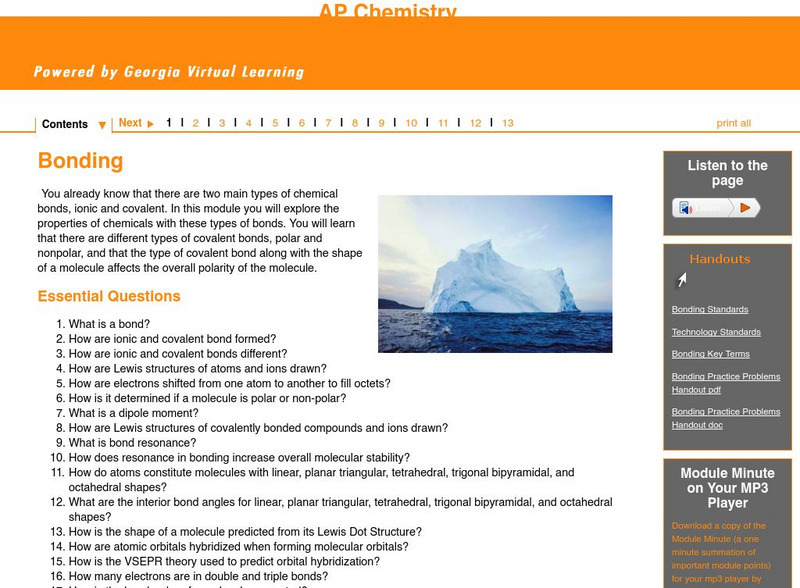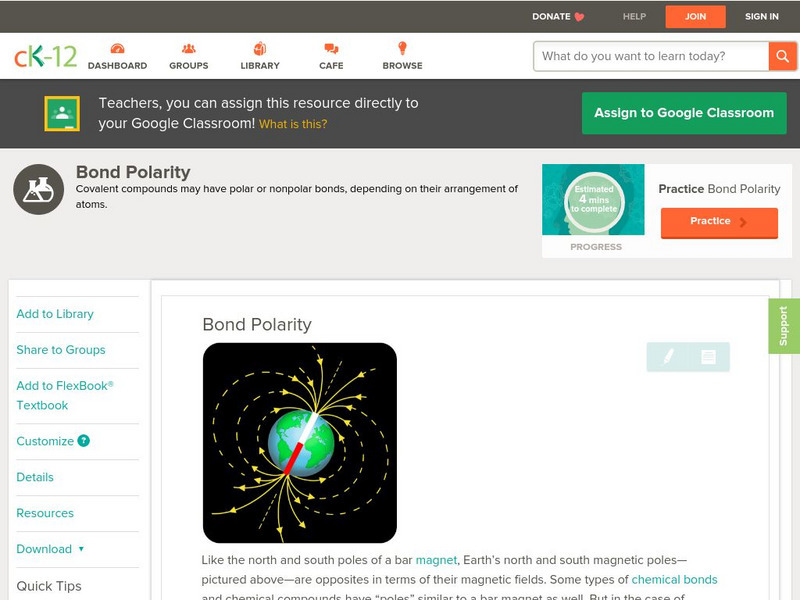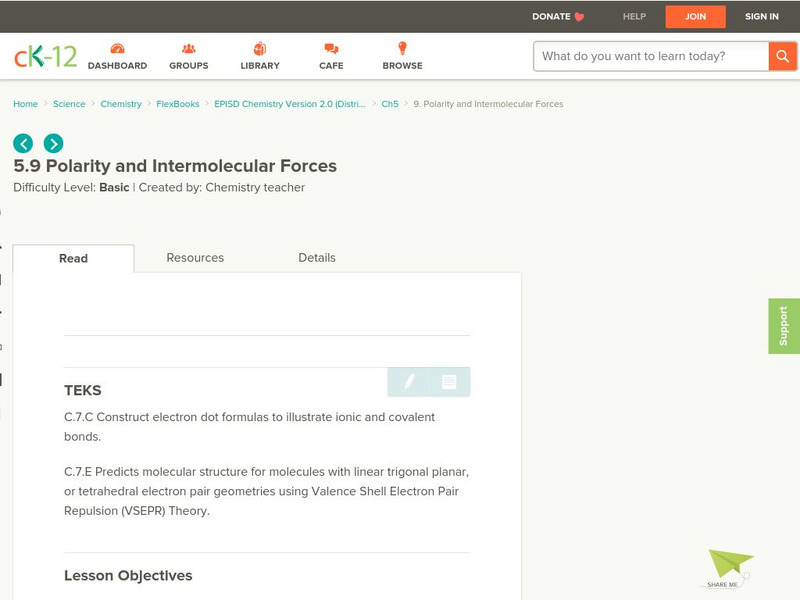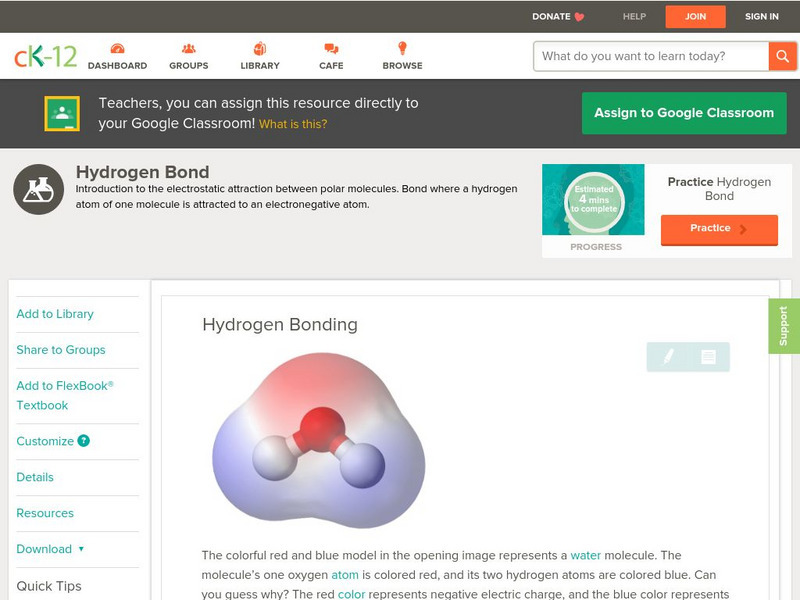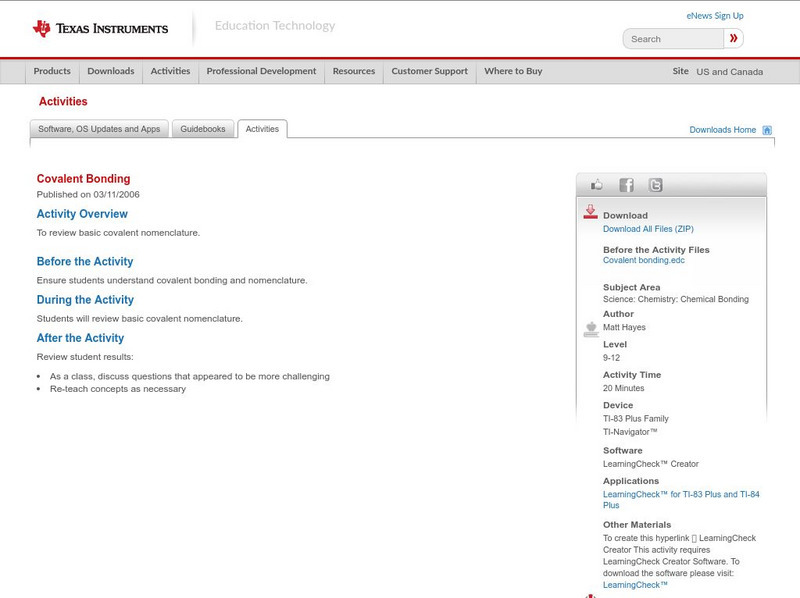Ohio State University
Ohio State University: Electronegativity & Bond Polarity
Excellent graphics help this page explain the relationship between electronegativity and bond polarity.
Concord Consortium
Concord Consortium: Stem Resources: Chemical Bonds
By working through this web-based activity, students differentiate between ionic, non-polar covalent, and polar covalent bonds. Specifically, distinctions are made between bonding types based on orbital shapes and electronegativity...
Georgia Department of Education
Ga Virtual Learning: Ap Chemistry: Bonding
In this module students explore the properties of chemicals with covalent and ionic bonds. Students learn that there are different types of covalent bonds, polar and nonpolar, and that the type of covalent bond along with the shape of a...
Concord Consortium
Concord Consortium: Molecular Workbench Showcase: Chemistry, Chemical Bonds
Simulations to show students the nature of chemical bonds. Simulations include an explanation of stereochemistry, atomic orbitals, chemical polarity, formation of an atom, and a summary quiz.
PBS
Pbs Learning Media: Covalent Bonding
This interactive activity from ChemThink takes a closer look at a covalent bond: how it is formed and how the sharing of two electrons can keep atoms together.
CK-12 Foundation
Ck 12: Physical Science: Bond Polarity
[Free Registration/Login may be required to access all resource tools.] Polarity and covalent bonds.
CK-12 Foundation
Ck 12: Polarity and Intermolecular Forces
[Free Registration/Login may be required to access all resource tools.] The following online tutorial describes how the electronegativity difference between two atoms in a covalent bond results in the formation of a nonpolar covalent,...
Frostburg State University
General Chemistry: Why Oh, Nh, and Fh Bonds Are Polar
Frostburg State University provides a brief explanation to the question of why small hydrogen molecules, such as OH, NH, and FH, are very polar.
Michael Blaber, PhD
Fsu: Basic Concepts of Chemical Bonding: Polarity and Electronegativity
Florida State University provides an explanation of electronegativity of elements and its affect on bond type.
CK-12 Foundation
Ck 12: Chemistry: Bond Polarity
[Free Registration/Login may be required to access all resource tools.] Covers polarity and covalent bonds.
Michael Blaber, PhD
Fsu: Molecular Geometry and Bonding Theories: Polarity of Molecules
Florida State University provides a discussion of polarity of binary and polyatomic molecules, with tables and graphics.
CK-12 Foundation
Ck 12: Chemistry: Covalent Bonding
A learning module giving the definition of a covalent bond, the compounds and elements they make up and why they form. Module includes reading and review questions.
University of Southern California
Atomic Bonds
This slide show on atomic bonds contains several slides on electron affinity. Other topics include covalent, Sigma and Pi bonds, and atomic bonding in solids.
Other
Chemical Bonds: Electronegativity
A slideshow with several slides dedicated to electronegativity, the trend which is illustrated in the slide at this link. Others slides explain how the electronegativity can be used to determine bond character.
CK-12 Foundation
Ck 12: Physical Science: Hydrogen Bonding
[Free Registration/Login may be required to access all resource tools.] Explains hydrogen bonds including why they form and changes of state.
Other
Personal Site: Covalent Bonding Single Bonds
This site is a personal site that gives "a simple view of covalent bonding" including explanations, diagrams, and examples.
Sophia Learning
Sophia: Polarity of Molecular Compounds: Lesson 2
This lesson will demonstrate how to use molecular shape to determine if a molecule is polar or nonpolar. It is 2 of 2 in the series titled "Polarity of Molecular Compounds."
Texas Instruments
Texas Instruments: Covalent Bonding
This activity helps students review basic covalent nomenclature.
Sophia Learning
Sophia: Characteristics of Chemical Bonds: Lesson 2
This lesson will present the basic properties and characteristics of chemical bonds. It is 2 of 4 in the series titled "Characteristics of Chemical Bonds."
Sophia Learning
Sophia: Characteristics of Chemical Bonds: Lesson 4
This lesson will present the basic properties and characteristics of chemical bonds. It is 4 of 4 in the series titled "Characteristics of Chemical Bonds."
State University of New York
State University of New York: Determining Molecular Polarity
The following module illustrates a method for determining if a molecule is polar or nonpolar.
Concord Consortium
Concord Consortium: Stem Resources: Electrons in Atoms and Molecules
A module with animations, explanations, and questions about the importance of electrons in the structure of an atom. Understand the definition and locations of electrons in the atom. Explore the role of electrons in bonding, polarity,...
Concord Consortium
Concord Consortium: Comparing Potential Energy of Bond
Explore the change in potential energy when molecules are separated from each other or broken apart.


